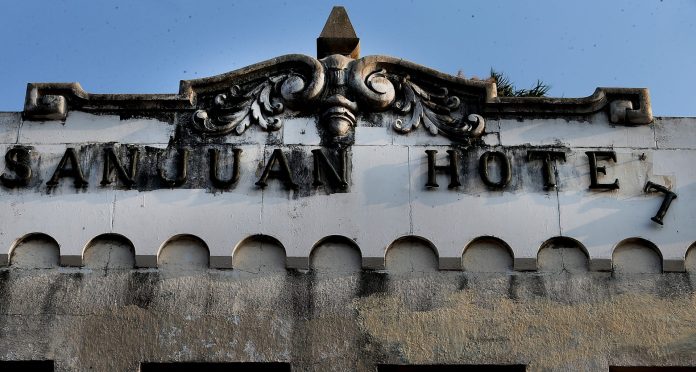
|
Only have a minute? Listen instead
Getting your Trinity Audio player ready...
|
SAN JUAN — Community members are beginning to organize and voice their opposition to potential plans by the city of San Juan to demolish the historic San Juan Hotel and make way for a multi-purpose events center.
During a San Juan City Commission meeting Tuesday, nine people signed up for the public comment portion of the agenda — of which seven spoke out against the demolition of the hotel.
Leading the charge was Dr. Stephanie Alvarez, a professor of Mexican-American studies at the University of Texas-Rio Grande Valley, who has been vocal about the need to preserve the hotel for its role in Rio Grande Valley Civil Rights history.
“I think that most people don’t know that the city wants to demolish it or has plans to demolish it,” Alvarez said after addressing the commissioners. “When we talk to people, what they say is that they don’t want to see it gone. That is the most iconic thing about San Juan in addition to the Basilica. I understand that it is an eyesore, but I have no doubt that there are things that can be done to restore it and ensure that the history of the community is not erased with demolition.”
Alvarez also handed out fliers for a public meeting she helped organize in support of the hotel next Monday from 4 to 6 p.m. at the San Juan Memorial Library. She is inviting community members as well as city and county officials to attend and partake in a discussion about the significance of the old hotel.
“We can just have a conversation about what we think is the best use for the San Juan Hotel so that it’s not just a surprise to us one day on an agenda,” Alvarez said.
Tania A. Chavez Camacho, executive director of La Union Del Pueblo Entero (LUPE), said that her organization has a history of working with UTRGV’s Mexican-American studies program and its professors. She said that through that partnership, she has become more knowledgeable about the hotel’s history and its significance to the community.
“I think it has become a beloved site by the community,” Chavez Camacho said. “I don’t think we are in opposition of the city commission. If anything, I think we are in support of embellishing the city. We want to be able to work with them to ensure that they preserve the hotel.”
Kimberly Grimaldo, a graduate student majoring in Mexican-American studies at UTRGV, also spoke during Tuesday’s meeting. As a lifelong resident of San Juan, she said that she felt compelled to speak in support of saving the hotel due to its history.
“A historic building just like the San Juan Hotel, it would be such a shame and dishonor for anyone who had prior been there to the hotel during its heyday for it to just be completely demolished and have something else built on top of it,” Grimaldo said.
She said that it was her first time attending a city commission meeting. Despite her hesitancy about addressing the commissioners, she said that she felt that it was important for her to voice her opinion.
“I believe it’s important to preserve the history of what was once there and if possible make it into a museum or a beacon that recognizes its history — as gruesome and dark as it may be, ” she said.
Gabriel Ozuna, who is the preservation chair for the Hidalgo County Historical Commission, said that the number of public comments during Tuesday’s meeting was a good indication of how the community feels about plans to demolish the hotel now that word is beginning to spread.
“People came and voiced their opinions,” Ozuna said after making his public comment. “It’s one of the most recognizable landmarks in the Valley because of its prominent location on Business 83, and I think people don’t want to see it demolished.”
Ozuna said that there are alternatives to demolishing the hotel that could prove beneficial to the community.
“We like encouraging things like adaptive reuse,” Ozuna said. “There are a lot of success stories where you take like an old factory and you turn it into condominiums. In this case, if there is a need for a community center or a Civil Rights museum like people are saying, there are ways to adapt the building using these preservation standards to meet that need. What it really requires is a willingness to work with the Texas Historical Commission, our state preservation office, and other preservation efforts.”
“When you work collaboratively with people who know what they’re doing, I think you’ll be amazed with the results.”
PREVIOUS COVERAGE:
Fate of historic San Juan Hotel murky amid plans for downtown revitalization



